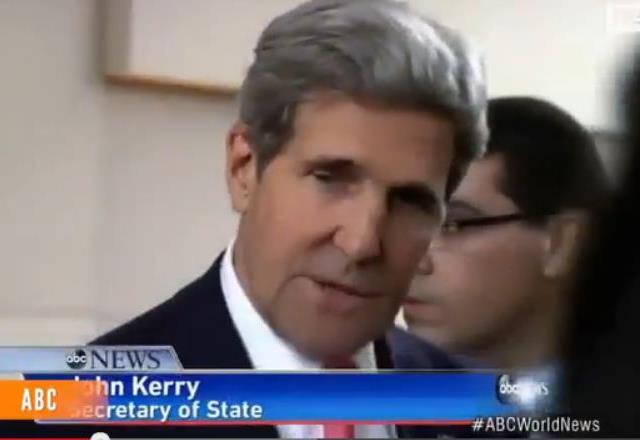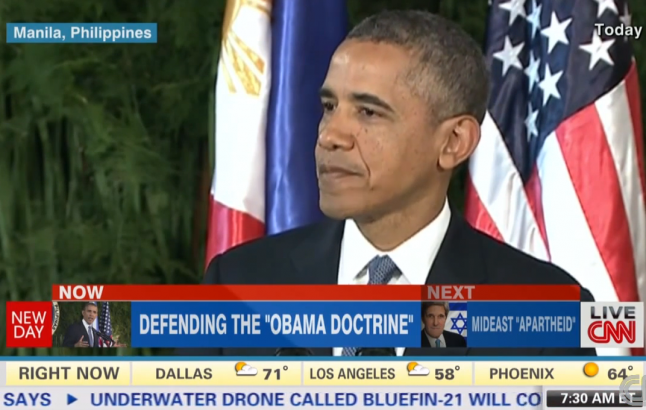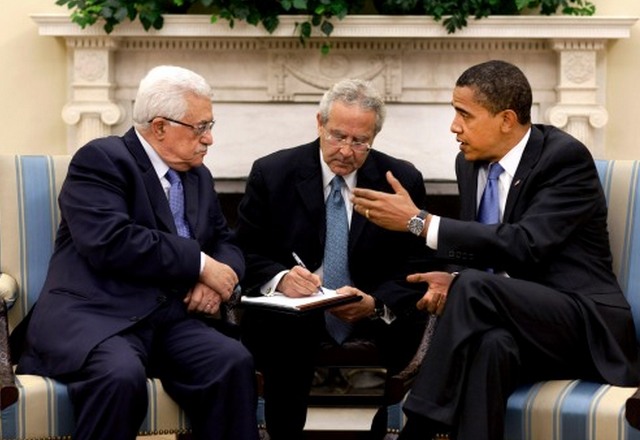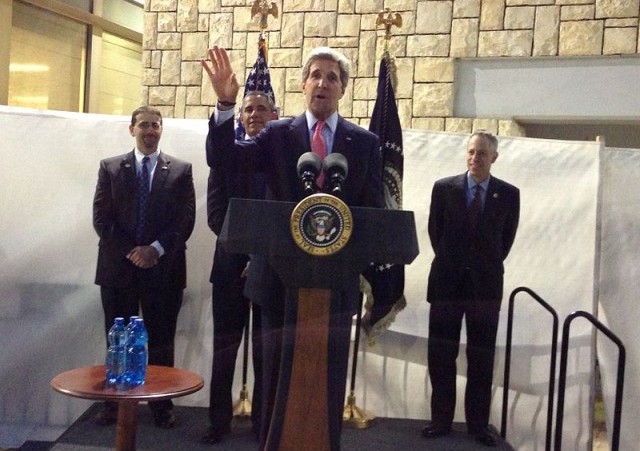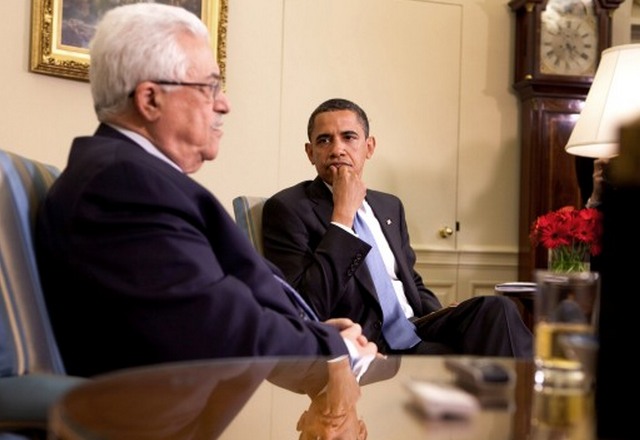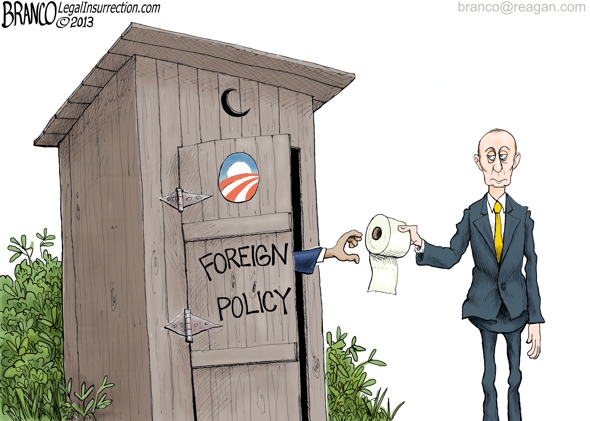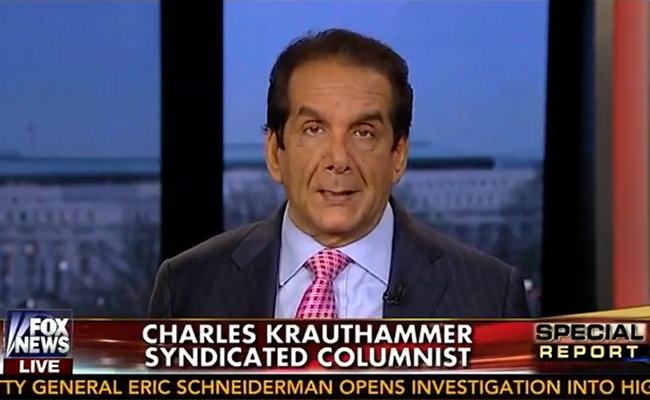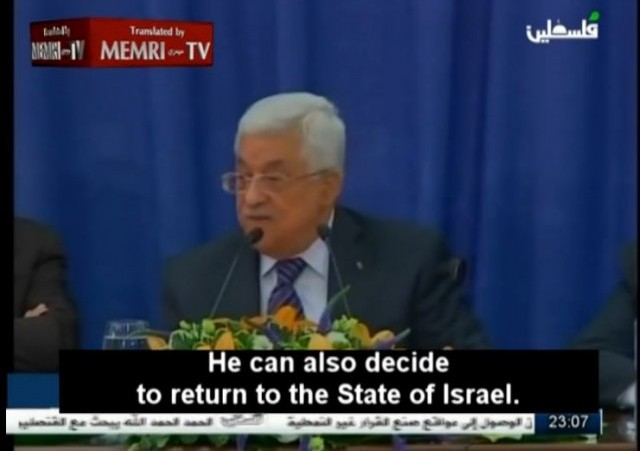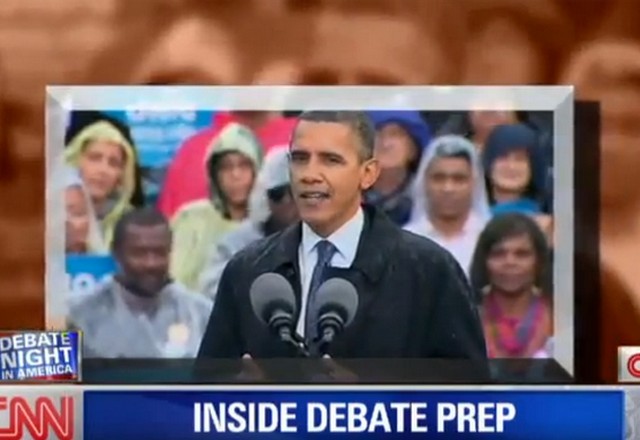Obama Foreign Policy Tag
John Kerry’s Long Knives
When All Else Fails, Blame Bibi...
Missing Barry Rubin
“If you only helped us intercept low-flying [regime] helicopters by providing a limited amount of antiaircraft weapons, with American approval, it would have a huge effect, morally and militarily,” Labwani said. “There are a million ways such weapons can be given to recognized people [in the opposition]. These weapons have ‘fingerprints’ and deactivation modes.” Alternatively, he said, Israel could declare a no-fly zone in southern Syria, as NATO did in Libya in its bid to topple Muammar Gaddafi. Such a move would immediately cause a large segment of Syrian society to support peace and normalization with Israel.But there's more to the interview. Labwani is not currently among the Western backed rebels. He explained why:
The Obama Straw Man Doctrine
Typically, criticism of our foreign policy has been directed at the failure to use military force. And the question I think I would have is, why is it that everybody is so eager to use military force after we’ve just gone through a decade of war at enormous costs to our troops and to our budget? And what is it exactly that these critics think would have been accomplished?Despite insinuating that critics of his foreign policy are essentially war-mongers, the President had trouble finding examples where the criticism of his foreign policy centered on a lack of American boots on the ground.
The mostly nonchalant reaction to Fatah’s embrace of Hamas
Don’t Blame Bibi
There are some moments a journalist will never forget. In early 1997, Yossi Beilin decided to trust me, and show me the document that proved that peace was within reach. The then-prominent and creative politician from the Labor movement opened up a safe, took out a stack of printed pages, and laid them down on the table like a player with a winning poker hand. Rumors were rife about the Beilin-Abu Mazen agreement, but only a few had the opportunity to see the document with their own eyes or hold it in their hands. I was one of those few. With mouth agape I read the comprehensive outline for peace that had been formulated 18 months earlier by two brilliant champions of peace -- one, Israeli, and one, Palestinian. The document left nothing to chance: Mahmoud Abbas is ready to sign a permanent agreement. The refugee from Safed had overcome the ghosts of the past and the ideas of the past, and was willing to build a joint Israeli-Palestinian future, based on coexistence. If we could only get out from under the Likud’s thumb, and get Benjamin Netanyahu out of office, he will join us, hand in hand, walking toward the two-state solution. Abbas is a serious partner for true peace, the one with whom we can make a historic breakthrough toward reconciliation. We understood. We did what was necessary. In 1999, we ousted Likud and Netanyahu. In 2000, we went to the peace summit at Camp David. Whoops, surprise: Abbas didn’t bring the Beilin-Abu Mazen plan to Camp David, or any other draft of a peace proposal. The opposite was true: He was one of the staunchest objectors, and his demand for the right of return prevented any progress.
Obama’s Middle Eastern “manhood problem”
No one jumped to Obama's defense when the charge was made...
Iranian U.N. Rep denied visa — will it stick?
UN pick "not viable" because part group that took over American embassy in 1979....
John Kerry’s Israel-Palestinian negotiation clown car
The Obama administration has been waging a secret media war in capitals across two continents blaming Israel for the recent collapse of peace talks with the Palestinians, according to former Israeli diplomats and Washington, D.C. insiders familiar with the peace process. Multiple sources told the Washington Free Beacon that top Obama administration officials have worked for the past several days to manufacture a crisis over the reissuing of housing permits in a Jerusalem neighborhood widely acknowledged as Israeli territory. Senior State Department officials based in Israel have sought to lay the groundwork for Israel to take the blame for talks collapsing by peddling a narrative to the Israeli press claiming that the Palestinians were outraged over Israeli settlements, the Free Beacon has learned. These administration officials have planted several stories in Israeli and U.S. newspapers blaming Israel for the collapse of peace talks and have additionally provided reporters with anonymous quotes slamming the Israeli government. The primary source of these multiple reports has been identified as Middle East envoy Martin Indyk and his staff, according to these insiders, who said that the secret media campaign against Israel paved the way for Secretary of State John Kerry to go before Congress on Tuesday and publicly blame Israel for tanking the talks.It makes sense. The John Kerry clown show has so mangled things, talking out both sides of the clown car, that the end result of Israel taking the blame was a foregone conclusion. John Podhoretz writes, Contemptible John Kerry blames Israel for his own mess:
More on that destructive Obama interview about Israel
We don’t know exactly what would happen. What we know is that it gets harder by the day. What we also know is that Israel has become more isolated internationally. We had to stand up in the Security Council in ways that 20 years ago would have involved far more European support, far more support from other parts of the world when it comes to Israel’s position. And that’s a reflection of a genuine sense on the part of a lot of countries out there that this issue continues to fester, is not getting resolved, and that nobody is willing to take the leap to bring it to closure.
Talk is cheap, releasing convicted terrorists just to talk is not
If it wasn't for the settlements, you see, the Palestinians undoubtedly would recognize Israel's right to exist as a Jewish state. Palestinian Authority President Mahmoud Abbas would formally forgo the so-called "right" of return for Palestinian refugees. Hamas and Fatah would bury the hatchet. U.S. Secretary of State John Kerry would win the Nobel Peace Prize, twice. And the boycott, divestment and sanctions movement would stop seeking to demonize and delegitimize Israel.
If it wasn't for the settlements, the Iranian Supreme Leader Ayatollah Ali Khamenei and President Hassan Rouhani would announce an end to Iranian nuclear enrichment activities and the dismantlement of all related nuclear facilities. The Iranians would also stop shipping missiles to the Islamic Jihad and Hamas.
After his litany, Weinberg, of course, acknowledged that he was being facetious and observes, "Settlements are an issue for negotiation, a solvable matter of dispute." It is easier to use settlements as an excuse for the lack of peace. Doing so, lets the Palestinians off the hook. It assumes that Israel has a partner for peace.
When he met with Palestinian President Mahmoud Abbas earlier this week, that's the approach that President Obama took. Obama said:
Obama-Putin an abusive relationship
Russia may revise its stance in the Iranian nuclear talks amid tensions with the West over Ukraine, a senior diplomat warned Wednesday. Russia's Deputy Foreign Minister Sergei Ryabkov said, according to the Interfax news agency, that Russia didn't want to use the Iranian nuclear talks to "raise the stakes," but may have to do so in response to the actions by the United States and the European Union. The statement is the most serious threat of retaliation by Moscow after the U.S. and the EU announced sanctions against Russia over its annexation of Ukraine's Crimea region. Ryabkov, who is Russia's envoy to the Iranian talks, said that Russia considers the "reunification" with Crimea as far more important than the developments surrounding the Iranian nuclear program.The featured image, a Branco Cartoon from September 2013, still rings true. So does this photoshop that made the rounds:
Krauthammer: Obama’s Sanctions on Russia a Joke
In response to the ongoing foreign policy crisis in Crimea, President Obama has imposed sanctions on eleven individuals from Russia and Ukraine. Reuters reported...
Obama, Harper and Cameron in Israel: Three Speeches, Two Friends
John Kerry windsurfs Jewish State issue
Kerry was for a Jewish State as part of a peace deal before he was against it....
Mahmoud Abbas wants One and One-Half State Solution
Mahmoud Abbas: "Our position is that the settlements – from start to finish – are illegal. They talk about settlement blocs, or about settlements here and there, but we say that every house and every stone that were placed in the West Bank since 1967 and to this day are illegal and we do not recognize them." […] "No resolution that we agree upon with the others will be passed unless it is confirmed by popular referendum of all the Palestinians worldwide." Applause […]
Did Obama sabotage Kerry on peace talks?
Or is this story even true? Is it actually one of those "good-cop/bad-cop" tales instead? It's difficult to say, but I vote ever-so-slightly for "true." My opinion of John Kerry is very low, but I think more of him than I do of Obama. The following seems...
Has WaPo Awakened from Its Obama Fantasy?
The President gets slammed by the Washington Post, which endorsed him twice....
Donations tax deductible
to the full extent allowed by law.
CONTRIBUTORS
- William A. Jacobson
Founder
- Kemberlee Kaye
Sr. Contrib Editor
- Mary Chastain
Contrib Editor
- Mike LaChance
Higher Ed
- Leslie Eastman
Author
- Vijeta Uniyal
Author
- Stacey Matthews
Author
- Jane Coleman
Author
- Ben Smith
Weekend Editor
- Elizabeth Stauffer
Author
- Mandy Nagy
Editor Emerita
- Learn more about the Contributors



